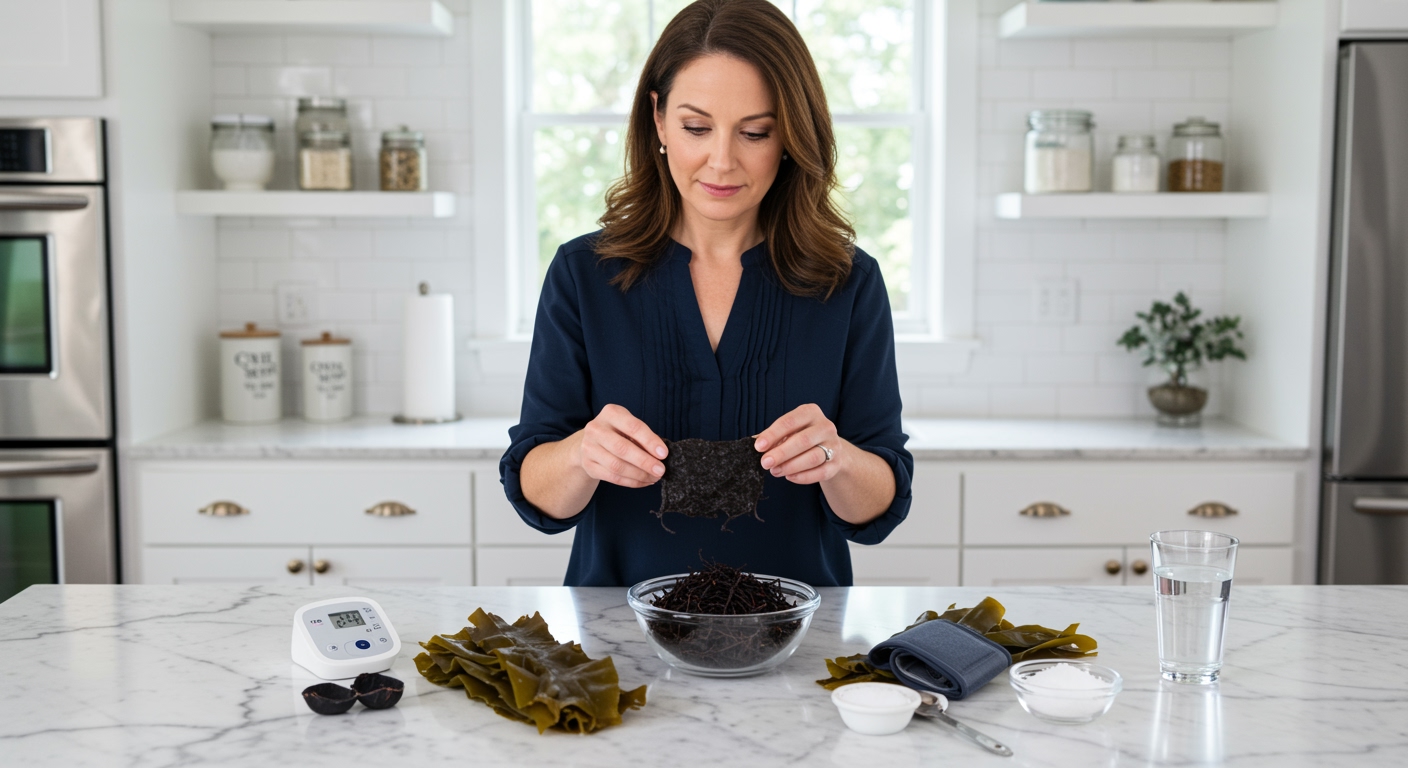✪ Key Takeaway: Hijiki seaweed may help lower blood pressure but contains dangerous arsenic levels that outweigh its benefits.
Introduction
You walk through the health food store and spot packages of dark, stringy seaweed labeled as a superfood from Japan.
You might be wondering if this exotic sea vegetable called hijiki can actually help lower your blood pressure naturally.
Hi, I am Abdur, your nutrition coach and today I am going to explain the complex relationship between hijiki seaweed and blood pressure management.
What Makes Hijiki Different From Other Seaweeds?
Hijiki stands out among seaweeds because of its unique mineral composition and processing methods.
This dark brown seaweed grows in rocky coastal areas around Japan and Korea.
Traditional preparation involves boiling and drying the seaweed multiple times to achieve its characteristic black color and chewy texture.
The processing concentrates certain minerals while unfortunately also concentrating toxic compounds like inorganic arsenic.
Unlike other seaweeds such as wakame or nori, hijiki absorbs and retains significantly higher levels of heavy metals from ocean water.
✪ Fact: Hijiki contains up to 100 times more arsenic than other commonly consumed seaweeds.
Does Hijiki Actually Lower Blood Pressure?
Research suggests that hijiki does contain compounds that could theoretically help reduce blood pressure.
The seaweed provides significant amounts of potassium, which helps counteract sodium effects and supports healthy blood vessel function.
Hijiki also contains bioactive peptides that may have ACE-inhibiting properties, similar to some blood pressure medications.
These peptides work by blocking enzymes that cause blood vessels to constrict and blood pressure to rise.
However, most studies showing blood pressure benefits focus on other seaweed varieties like wakame rather than hijiki specifically.
The limited research on hijiki itself makes it difficult to confirm whether the potential benefits outweigh the serious safety concerns.
✪ Pro Tip: Choose wakame or kelp instead for proven blood pressure benefits without arsenic risks.
Why Do Health Authorities Warn Against Hijiki?
Multiple international health agencies have issued specific warnings about hijiki consumption due to arsenic contamination.
The UK Food Standards Agency advises people to avoid eating hijiki completely because of cancer risks associated with inorganic arsenic.
Inorganic arsenic is classified as a Group 1 carcinogen, meaning it definitely causes cancer in humans with long-term exposure.
Regular hijiki consumption can lead to arsenic accumulation in your body, potentially causing skin problems, cardiovascular disease, and increased cancer risk.
Even small amounts consumed occasionally may contribute to your total arsenic burden over time.
The irony is that while seeking to improve heart health through blood pressure reduction, you might actually increase your risk of heart disease through arsenic exposure.
✪ Note: No safe level of inorganic arsenic consumption has been established by health authorities.
What Are Better Seaweed Options For Blood Pressure?
Several other seaweed varieties offer proven blood pressure benefits without the arsenic concerns of hijiki.
Wakame seaweed has been specifically studied and shown to reduce both systolic and diastolic blood pressure in clinical trials.
This green seaweed contains fucoxanthin, a compound that helps improve blood vessel flexibility and reduces inflammation.
Kelp provides excellent amounts of potassium and magnesium, both crucial minerals for maintaining healthy blood pressure levels.
Nori sheets, commonly used in sushi, offer similar benefits with much lower heavy metal content than hijiki.
These safer alternatives provide the cardiovascular benefits you seek without exposing you to dangerous levels of toxic compounds.
✪ Pro Tip: Start with small amounts of wakame or kelp to assess your tolerance before increasing portions.
The Bottom Line
While hijiki seaweed may contain compounds that could theoretically help lower blood pressure, the high arsenic content makes it too dangerous to recommend for regular consumption.
Your health is worth more than any single superfood promise, and safer seaweed alternatives provide similar benefits without the risks.
I would love to hear your thoughts about seaweed in your diet or any questions you might have about natural blood pressure management in the comments below.
References
At NutritionCrown, we use quality and credible sources to ensure our content is accurate and trustworthy. Below are the sources referenced in creating this article:
- PMC: Seaweed and Blood Pressure Research
- PMC: Marine Compounds and Cardiovascular Health
- NutritionFacts: Wakame Seaweed Salad May Lower Blood Pressure
- Healthline: Benefits of Seaweed





